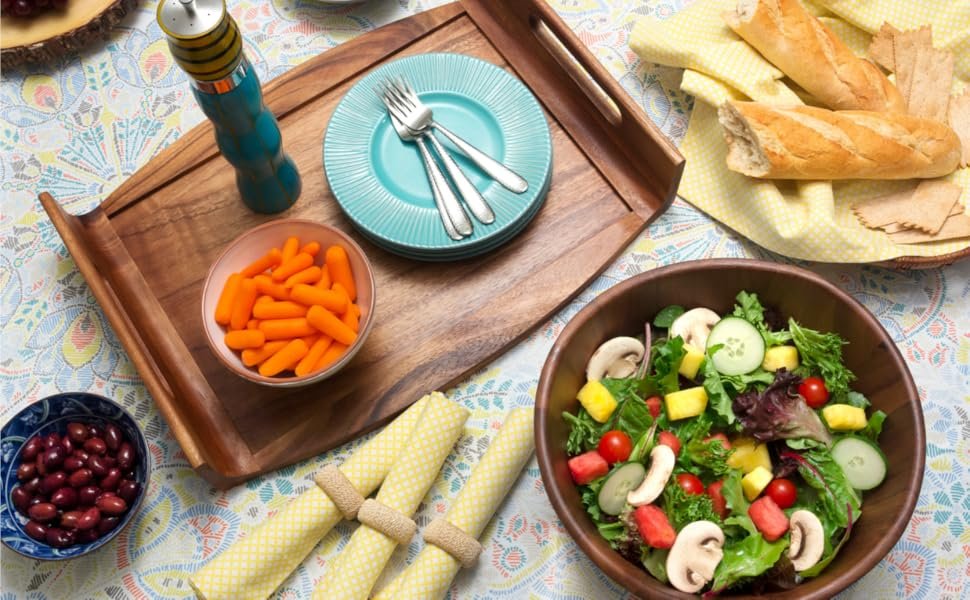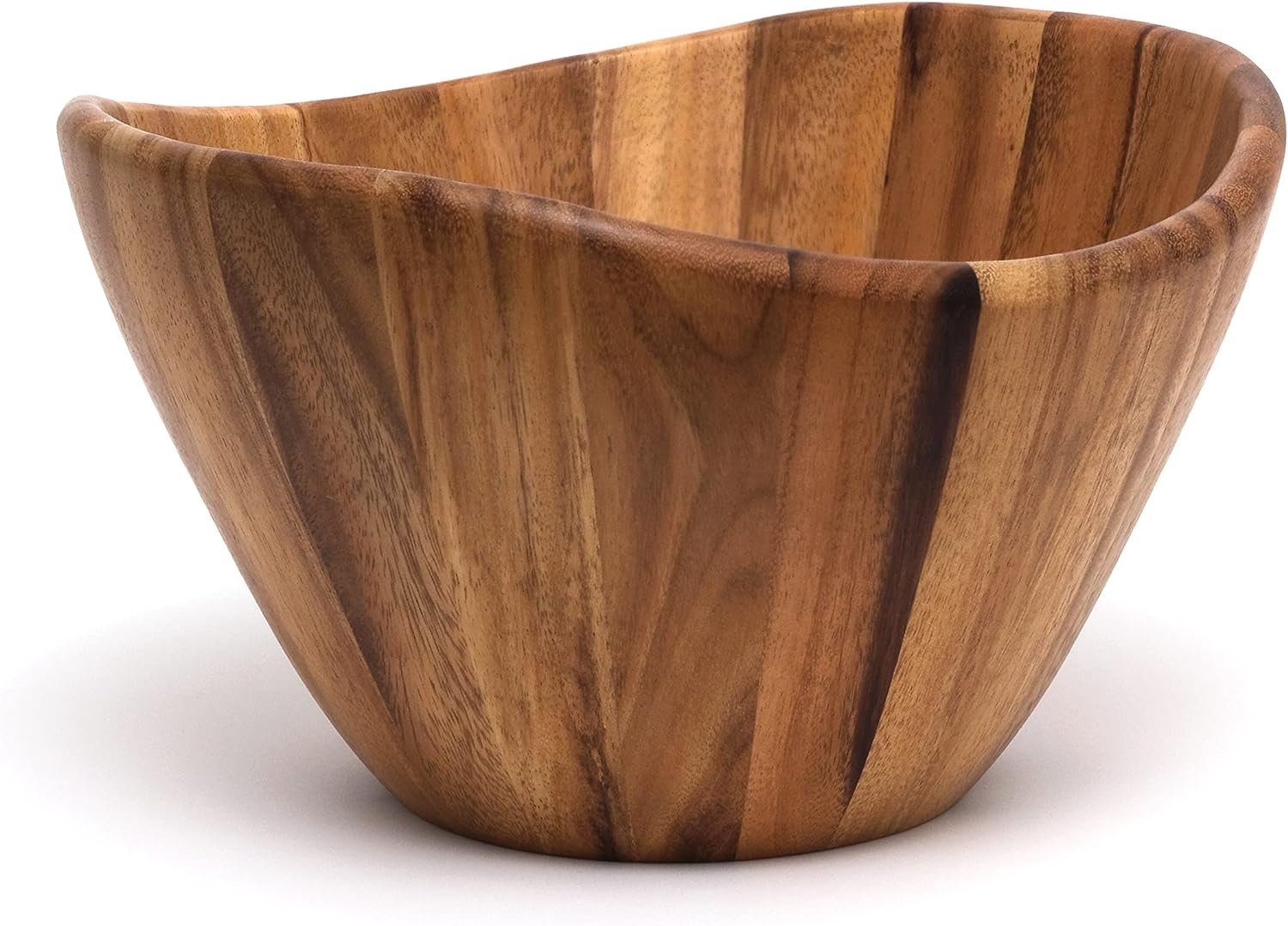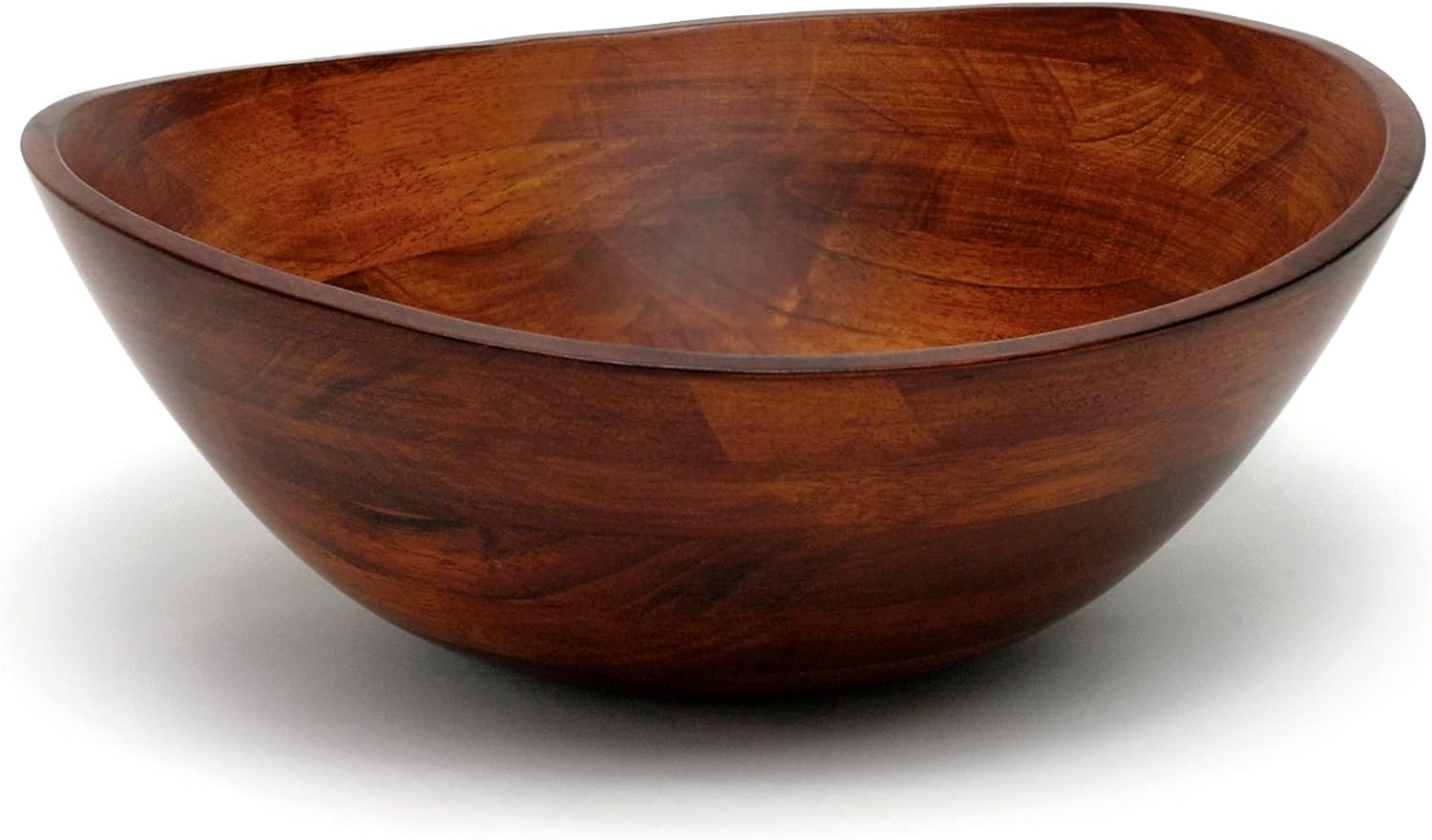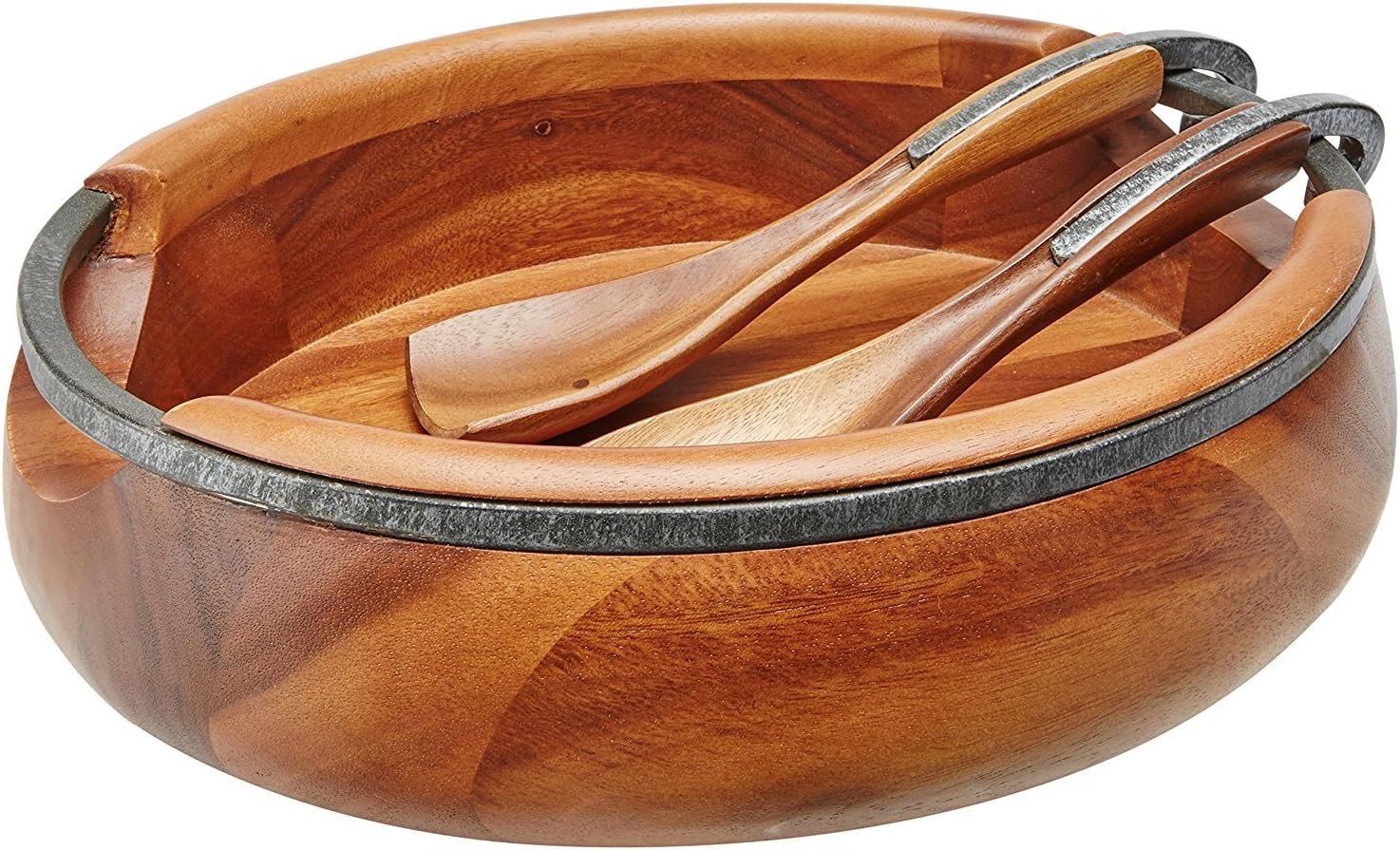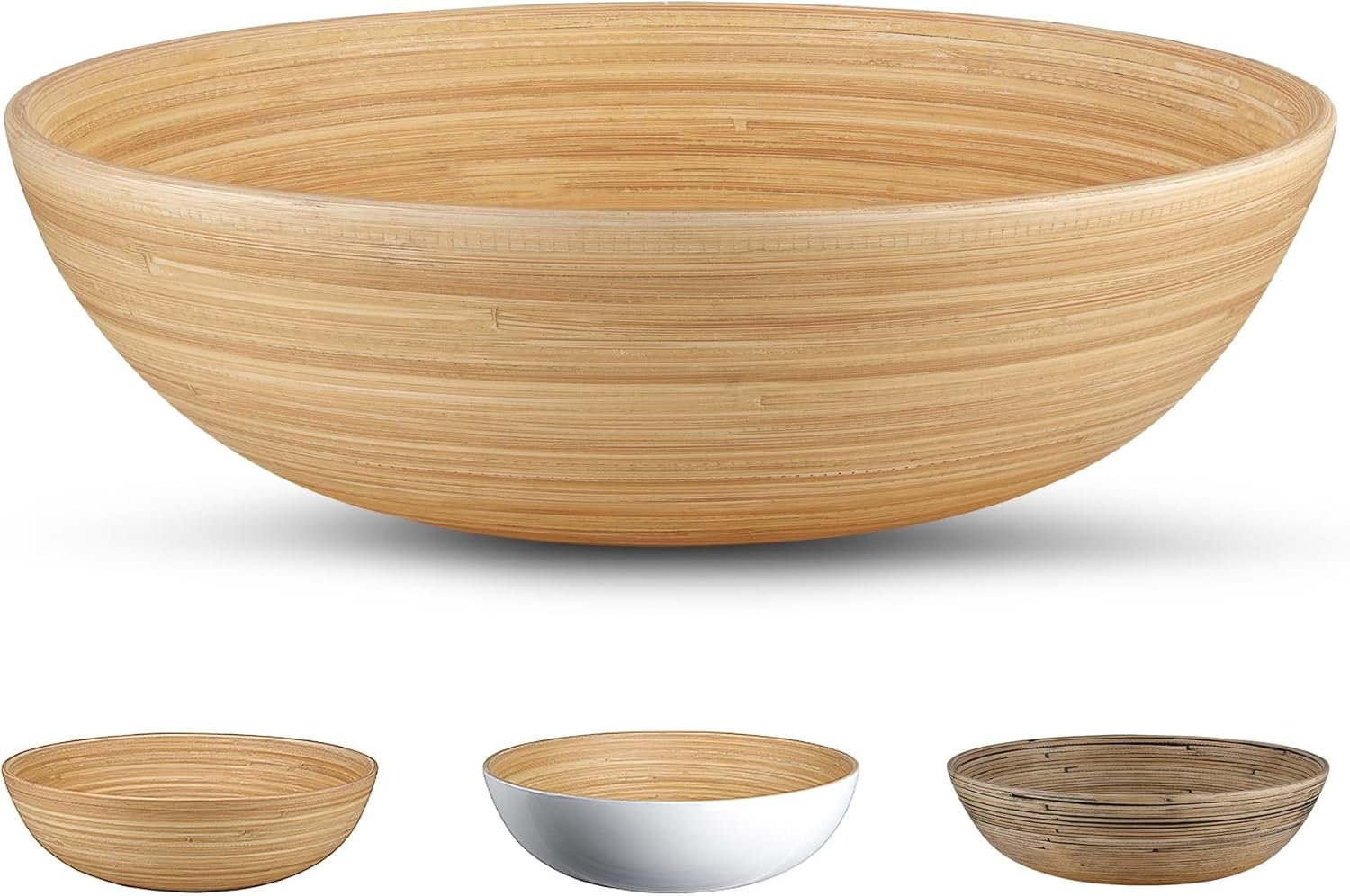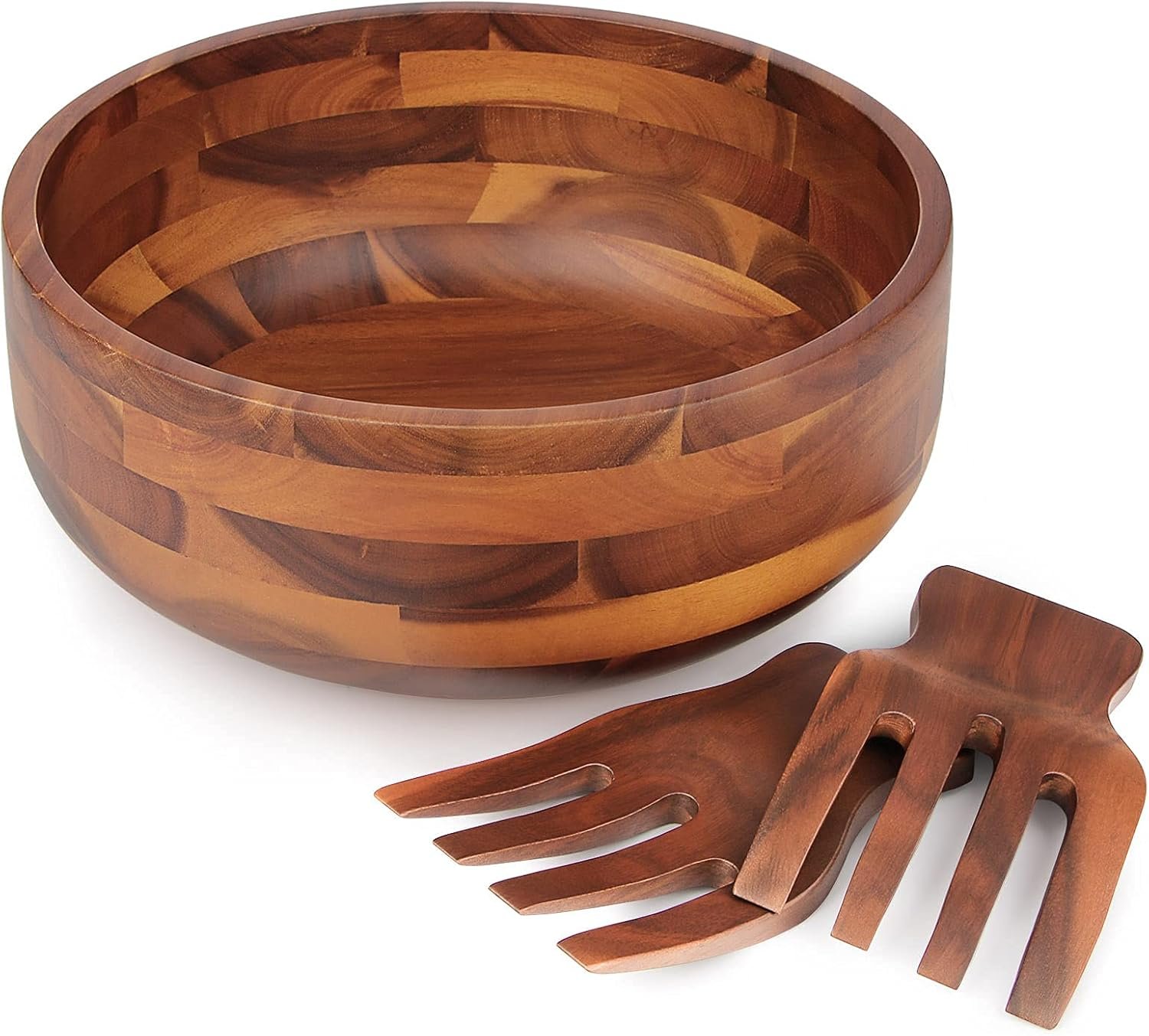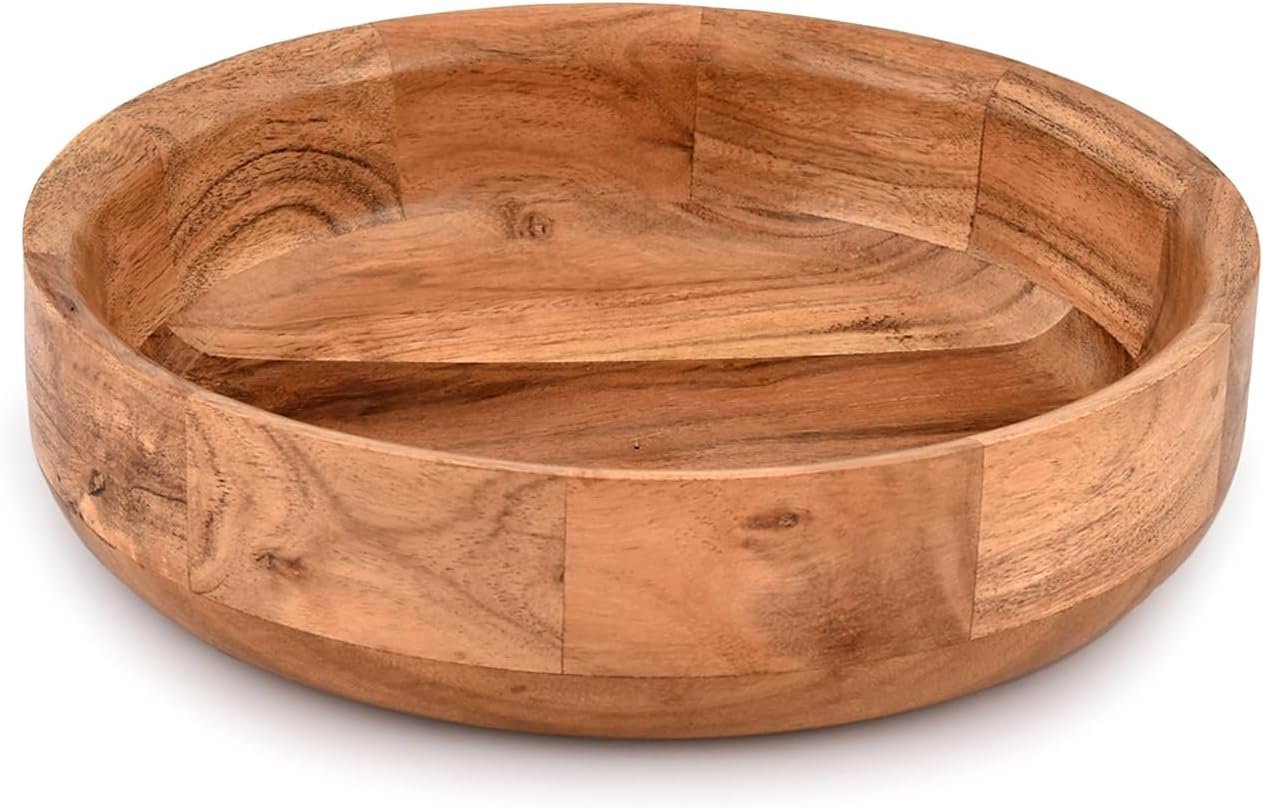You don’t need a particular occasion to treat yourself to one, and selecting the best wood for salad bowls doesn’t have to be difficult. People have loved wooden salad bowls for a long time, bringing a cozy and stylish touch to every meal. A wooden bowl can really enhance your meal, whether you’re having friends over for dinner or just making a quick lunch.
A wooden salad bowl can seem special and desirable due to its lasting quality and higher cost, making it something you might consider adding to a wedding registry. You don’t need a big occasion to buy one. If you know where to search, you can discover a lovely bowl in various sizes and wood types that fits any budget. I talked to chefs, cookbook authors, restaurant critics, and food writers to find the best wooden salad bowls they recommend and often gift-worthy wooden salad bowls to others.
It turns even a basic salad into something special to look at. With so many choices available, it’s important to choose one that is sturdy, safe for food, and within your budget.Need more kitchen basics? Look at the alternatives of wooden salad bowls, non-toxic bowls and stainless steel bowls made in USA for more great choices. This guide will look at the best types of wood for salad bowls and assist you in making a smart choice.
Related Content
For even more healthy kitchen swap, check out our recommendations
non-toxic waffle makers,
cake molds, Top Airfryers,
backpacking pans,
pots and pans for cooktop,
Coffee makers.Key Factors When Picking Wood for Salad Bowls
When choosing the right wood for salad bowls, think about these factors to make sure your bowl is sturdy, safe, and simple to maintain. Using quality materials such as cherry, walnut, and acacia wood means your bowl will not only look great but also serve you well in the kitchen for many years. A best wooden salad bowl should be safe, long-lasting, and easy to maintain.
Concerns About Food Safety and Toxicity
When choosing wood for salad bowls, it’s important to prioritize food safety. Some types of wood aren’t safe for direct contact with food. Picking wooden bowls that are eco-friendly and made from non-toxic materials guarantees that your salad bowls are safe for your health and the planet.
- Non-Toxic Woods: Choose woods that are safe for food and do not contain harmful chemicals or toxins. Cherry, maple, and walnut are great choices.
- Stay Away from Treated Woods: Don’t use bowls made from treated or stained woods, since they can release harmful substances into your food.
- Natural Oils: Bowls made from untreated wood keep their natural features, ensuring they are safe for daily use. Choose the best oils for treating wooden salad bowls, such as mineral oil or beeswax, to improve their safety and extend their lifespan.
Strength and Crack Resistance
Durability is an important aspect to consider when selecting the best wood for crafting salad bowls. The bowl should be able to handle everyday use without falling apart.Strong woods make sure your bowl can withstand everyday use and keep its shape for a long time.
- Hardwood Options: Choose hardwoods such as acacia, walnut, and cherry, as they are recognized for their durability against cracking and denting.
- Janka Hardness Ratings: Choose woods with high Janka ratings, like maple (1,450) or walnut (1,010), for durability and lasting use.
- Moisture Resistance: Acacia wood naturally resists water, which helps prevent warping or splitting.
Top Recommended Woods for Salad Bowls
Why Sustainability Matters
If you buy salad bowls made from sustainable harvested wood, you can be sure that they won’t hurt the earth. At Spencer Peterman, for example, logs that have been cut down are turned into beautiful dishes instead of being thrown away or burned. This eco-friendly method cuts down on trash and protects trees.
Picking the best wood for salad bowls means picking materials that are carefully found, like cherry, maple, or acacia. Not only do these choices help the environment, but they also give you sturdy bowls that are safe for food.
After you’ve removed the unsafe bowls, it’s time to choose the wood that suits you best. There are many wonderful woods, but not all of them are the same when it comes to making bowls. We should be constantly aware. We’ve been handcrafting wooden bowls for quite a while now, and if there’s one thing we truly love, it’s wood. Hardwoods are a great choice for wooden bowls because they are durable and scratch-resistant and dents. Softwoods are lovely, but they can be a bit too delicate for everyday use.
Hello there!Picking the perfect wood for salad bowls can be a bit daunting with all the beautiful choices out there. When it comes to wood, there’s something special about each type! Whether you’re after durability, eco-friendliness, or just a lovely look, every kind brings its own unique charm. Here’s a helpful guide to choosing the ideal wooden salad bowl for your kitchen.
Maple Wood Salad Bowl
For those who want a soft, milky tone with a rustic charm, maple wood is a timeless option. Maple is a bowl made from hardwood because it has a fine grain and is very durable. The tough surface stands up to scratches and dents, making it a smart and durable choice. As time goes by, maple wood becomes a bit darker, adding to its appeal. People in New England really love maple wood because it reminds them of their roots, which is why it’s a popular option for making wooden bowls by hand. Many New Englanders cherish maple wood for its nostalgic ties to the region, making it a beloved choice for handcrafted wooden bowls.
- scratch-resistant and long-lasting.
- Bright, natural style.
- Totally safe for food and simple to keep clean.
- Maple wood is a great option, particularly if you like a lighter and more natural appearance.
Durability: Maple has a Janka rating of 1,450, making it strong and resistant to scratches.
Appearance: The creamy, light tones and fine grain bring a straightforward yet classy appeal to any table.
Maple wood improves as it ages, developing a richer, darker color over time.
Maple wood salad bowls are perfect for anyone looking for a timeless, simple design that complements colorful salads beautifully.
Cherry Wood Salad Bowl
Cherry wood is recognized for its beautiful reddish-brown colors and smooth texture, providing both style and practicality. Cherry wood is strong and tough, with a Janka hardness rating of 995, which helps it resist dents and scratches.It deepens wonderfully as time goes on, developing a rich, dark hue.
Cherry bowls are safe for food use because they don’t need any fillers or stains, making them completely food-safe. Cherry wood is one of the best choices for salad bowls, known for its beautiful reddish-brown colors and smooth feel.
Cherry wood gets darker as time goes by, creating a deep, rich color that gives your bowl a unique character. The mineral flecks give each bowl its own unique look, and the food-safe features mean there are no stains or fillers needed.
Why Cherry?
- Rich, warm ones that get better over time.
- Straight, smooth grain for a polished appearance.
Perfect for presents and bowls that can be passed down through generations.
Cherry wood is highly valued for its distinctive mineral streaks that provide a beautiful contrast, ensuring that each bowl is truly unique.
Acacia Wood Salad Bowl
Acacia is one of the most useful and eco-friendly woods for salad bowls. Acacia is known for its deep brown and earth-tone colors. It is also very strong and doesn’t get damaged by water, so it’s great for everyday use. It grows quickly and steadily, so it can be used over and over again. This makes it a cheap option for people who want a good bowl but don’t want to spend a lot of money on it.
A reasonable choice that won’t break the bank. Acacia wood is a great choice for salad bowls because it is eco-friendly and can be used in many ways. Acacia wood salad bowls are great for people who care about the environment because they are beautiful, long-lasting, and budget-friendly. Acacia trees grow like they’ve chugged five espressos. This quick growth ensures a more renewable source,
- Beautiful and complex nature patterns.
- Not easily damaged by water or rot.
- Green: Acacia trees grow quickly, so they are a good choice for the long term.
- Durability: Your bowl will last for years because it is very resistant to water and rot.
- Aesthetic Appeal: The natural golden and brown tones and flowing grain patterns of acacia are truly beautiful.
Walnut Wood for Salad Bowls
If you like a rich, dark color, walnut wood is great for you. It has a Janka hardness grade of 1,010, so it’s strong and beautiful to look at. Its rich chocolate color makes any setting look better. Walnut is a dark wood with a straight grain that looks like chocolate. Because it looks good and lasts a long time, it is often used for high-end salad bowls.
Many people say that walnut bowls are bold and one-of-a-kind, which is why people who like high-end housewares love them. There is even a light walnut smell in some bowls that goes away over time.
Black walnut salad bowls have a striking difference between the light and dark brown colors. The smell of walnut is strong, making them different from all other woods. Some of the tastes from the wood get into the food, which you might or might not like. Also, black walnut is one of the toughest woods you can buy.
Why Walnut?
For class, use rich, dark brown tones.
Excellent strength and longevity.
Having its own smell and taste.
Olivewood Salad Bowl
It’s a heavier, thicker wood that’s great for making family pieces because of its twisting grain patterns and shiny finish. With its bit of Mediterranean grace, olivewood makes every meal feel like a special one. Because it is naturally hard, it can stand up to daily use and still look beautiful.
Olive wood looks like the Mediterranean and is very strong. You can always choose olive wood salad bowls because they add a touch of Classic wooden salad bowls and history to your kitchen.
- Unique Grain: The flowing, complex designs in olive wood make every bowl a work of art.
- Hardness: The wood is thick and strong, making it great for everyday use.
- Food-Safe: Like cherry and walnut wood, olive wood doesn’t need to be stained, so it’s safe to use for serving food.
- Beautiful, complex grain designs.
- Dense and strong, great for everyday use.
- Built to last and not break easily.
Bamboo Salad Bowl
Even though bamboo is a grass, it has become a choice among buyers who care about the environment. It’s a great option to standard wood because it’s light and doesn’t harbor germs. Bamboo grows quickly, making it a long-lasting choice that is good for the environment.
- Very long-lasting and good for the environment.
- Antibacterial qualities that happen naturally
- It’s not heavy and is easy to handle.
Choosing the right salad bowl can transform your dining experience. Whether it’s the dramatic look of walnut, the sustainable charm of bamboo, or the timeless appeal of cherry, each wood offers its own unique benefits. Embrace the warmth and elegance of wooden bowls, and enjoy meals with a touch of nature.
Woods Not to Use for Salad Bowls
When choosing the best wood for salad bowls, it’s important to think about more than just how long the wood will last and how nice it looks. You should also think about how it will affect the environment. Even though some types of wood look nice, they aren’t good for this purpose because they aren’t sourced in a safe way or are overharvested. Using these woods can lead to ecosystem loss, tree loss, and other environmental problems. Here are some types of wood you should stay away from
Beech
Beech is not sturdy enough for kitchenware. Beech will yellow, fade, and become gray without care. This may be compensated by unsafe food staining or dyeing. Look for goods stained or sealed with food-safe stains, varnishes, or shellac.Many beech wood salad plates are available. These bowls may appear fine, but untreated wood will turn yellow and gray. Many producers stain, paint, or polish wood to mitigate its fragility and fading. These treatments may improve the bowl’s look and lifespan, but they are not food-safe.
Oak
Oak servingware is beautiful yet fragile. Oak is easy to chip and split, shrinks as it matures, and needs staining to show off its qualities. Always avoid non-food-safe discolored goods.We like wood floors, but not salad plates. Oak bowls are fragile. They chip and split easily (particularly if used with other culinary equipment) and shrink. Oak is ugly in addition to these drawbacks. It stains well, so many people are misled by its appearance.
However, this discoloration is unsafe near food and only briefly hides faults.Oak bowls chip and fracture readily. Oaks bowls stain well, so their appearance appeals to many. The discoloration is dangerous near food and only conceals flaws momentarily. Avoid red oak dishes and other items because their permeable cell walls let moisture in.
Servingware made of white oak (Quercus alba) is more durable. It has been used to make wine and liquor barrels and boats because of its water resistance.
Birch
Birch, a softer hardwood, shrinks when dried, making it ideal for twisting and warping. Thus, it is unsuitable for manufacturing durable bowls.Birch, known as the poor man’s cherry, is not suited for wooden bowls. Though cheaper than cherry, this wood is softer and less durable. Dried and warped, it loses roughly 16% of its volume. Warping and twisting salad bowls is bad.The beech bowls appear beautiful, but untreated wood becomes yellow and gray. Manufacturers stain, paint, or polish wood to make up for its fragility and fading hue. These treatments may improve the bowl’s look and lifespan, but they are not food-safe.
Mahogany
Mahogany is valued for its deep color and long life, but the way it is usually sourced is often questionable.
- Concerns about the environment: A lot of mahogany trees are cut down in jungles, which causes a lot of trees to be cut down.
- Concerns about sustainability: Too much gathering has destroyed habitats and lowered the variety of life on Earth.
Even though mahogany is very beautiful, you should not use it for your salad bowl. Instead, choose a wood that is better for the environment and was taken in a way that doesn’t harm the trees.
Teak
Teak is strong and doesn’t get wet easily, which is why it’s often used for boats and outdoor furniture. But it’s not the best choice for salad bowls.
- Illegal cutting: A lot of the teak on the market comes from Southeast Asia, where illegal and wasteful cutting is done.
- Environmental Impact: Cutting down too many teak trees leads to soil erosion and loss of trees.
If you want to find the best wood for salad bowls, you should choose wood material that is better for the environment, like acacia or walnut.
Ebony
Ebony is a thick, dark wood that looks expensive and classy, but it can’t be used for very long.
Slow Growth Rate: Ebony trees grow very slowly, which makes them easy to cut down too many times.
- Unsustainable Harvesting: The high demand for ebony has caused illegal logging and cutting down of trees, which has had a big effect on the population.
If you want the same look without hurting the environment, you could look at bowls made from ebonized wood. This is a method that uses local, sustainable materials to make wood look like ebony.
What is the best way to choose wood for salad bowls?
When you choose wooden salad bowls, you’re not just selecting any piece of wood to hold your greens. You’re choosing a blend of creativity, tradition, and food knowledge. Start by prioritizing quality. Lightweight and cheap wooden bowls just don’t last, and that can be really annoying. Buying a good bowl allows you to enjoy it now and hand it down for years to come.
All American Farmhouse Bowls are made by hand from high-quality solid hardwood, ensuring they are top-notch and free from any defects or knots. All of them come with a lifetime guarantee, ensuring they last for years to come.
Next, choose a bowl made of natural wood that doesn’t contain glues, additives, fillers, or stains. Wood is naturally beautiful, so there’s really no need to add stains to it. If you’re looking for a bowl with a lighter tone, go for Maple.
Do you enjoy darker bowls? If that’s the case, Black Walnut is the right choice for you. It’s best to steer clear of bowls that look like they’re made from smaller wood pieces, since the glues and fillers might not hold up over time. All American Farmhouse Bowls are made from one solid piece of North American hardwood, no fillers or glues at all.
7 Wooden Bowls For Salad
Best Overall:
Lipper International Acacia Wave
⬇️ Jump to review
Best Cherry Wood:
Cherry Wavy Rim Lipper International
⬇️ Jump to review
Best Serving:
Nambe Anvil Salad Bowl with Servers
⬇️ Jump to review
Natural Bamboo LEXA 12 Handmade
⬇️ Jump to review
AIDEA Acacia Wood Salad Bowl Set
⬇️ Jump to review
Kaizen Casa Wooden Round
⬇️ Jump to reviewLipper International Acacia Wave
The Lipper International Acacia Wave Serving Bowl is a must-have for anyone seeking a blend of style, functionality, and sustainability in their kitchenware. This bowl, crafted from high-quality acacia wood, showcases a stunning wave design that elevates any dining experience. Its 12″ diameter and 7″ height make it perfect for serving salads, fruits, or even snacks like popcorn, whether you’re hosting a dinner party or enjoying a family meal.
Renowned for its rich, contrasting grain patterns, acacia wood offers a natural elegance that fits seamlessly into various table settings. This product, one of the top-rated salad bowls, combines beauty with durability, ensuring it endures over time. The chemical-free mixing bowl design guarantees safety, making it an excellent choice for those choosing non-toxic salad bowls and prioritizing food safety.
In addition to its aesthetic appeal, this eco-friendly kitchenware reflects sustainability. Acacia wood is a renewable resource, and its sturdy construction means this bowl will last for years, reducing the need for replacements. Moreover, its budget-friendly wooden bowl pricing makes it accessible without compromising on quality, making it a great pick among premium salad bowl brands.

Maintaining the bowl is straightforward: hand wash with mild soap and cool water, avoiding soaking or exposure to dishwashers, microwaves, or refrigerators. For lasting beauty, occasional conditioning with mineral oil enhances its luster.
Whether as a centerpiece or a functional serving bowl, the Lipper International Acacia Wave Bowl is an excellent addition to your tableware collection. Its versatile use, high-quality acacia wood, and eco-conscious design make it one of the best choices for wooden salad bowls in the market today.
| PROS | CONS |
|---|---|
| ✅ Durable and Long-Lasting | ❌ It Requires careful cleaning by hand. |
| ✅ Eco-Friendly and Safe | ❌ It is not dishwasher-safe |
| ❌ Cannot be used in microwaves or refrigerators. | ❌ It requires careful cleaning by hand. |
Cherry Wavy Rim Lipper International
The Lipper International Cherry Finish Collection provides a great mix of elegance, functionality, and sustainability for your kitchen. Made from safe wood for salad bowls, this elegantly designed serving bowl is a practical addition to your set of wooden serving dishes. The rich cherry stain and unique wavy rim make it a practical and attractive option.
Quality Craftsmanship This highly rated salad bowl is made from sustainably sourced rubberwood, providing both strength and a thoughtful option for sustainable kitchenware lovers. The warm cherry finish brings out the natural grain, making it a beautiful piece for both casual meals and formal gatherings.
Great for Various Applications The Lipper International Cherry Finish Bowl, perfectly sized for all your needs, is ideal for serving fresh salads, popcorn, or fruit medleys. Cherry is a popular wood for kitchen bowls that brings warmth to any table and looks great against darker surfaces.
Easy Maintenance for a Long Life Keep the bowl looking great with the right care. Wash by hand using gentle soap and cool water, steering clear of dishwashers or soaking. Using mineral oil regularly keeps the wood hydrated and maintains its smooth finish, ensuring it stays a functional and stylish centerpiece for years.

| PROS | CONS |
|---|---|
| ✅ safe mixing bowl materials, guaranteeing your food’s safety. | ❌Rubberwood might not be as strong as top-notch acacia wood. |
| ✅ stylish design with a rich cherry wood salad bowl finish | ❌ Prone to cracking with drastic temperature shifts. |
| ✅ |
Nambe Anvil Salad Bowl with Servers
Excellent product. The bowl is heavy, solid, and made of beautiful wood. The metal accent truly stands out. I got this as a birthday gift, and everyone at the party was really impressed. The recipient really enjoyed it!I’ve used a lot of salad bowls, and regardless of the price, they just don’t last. A friend suggested this bowl she has tried, and it looks great, cleans easily, accommodates both large and small amounts, and includes utensils. Highly suggest.
The size of this salad tosser surprised me a little. It’s large. The look is impressive, and the design is strong and useful.The ideal match: The anvil salad bowl, crafted from acacia wood, complements bright greens and veggies beautifully. The colors of your Salad stand out against the dark acacia wood. Your first course looks incredibly fresh and appetizing.
INCLUDED SERVERS: A pair of matching, softly fluted servers gently curve around the bowl’s rim, creating a perfect resting spot, ensuring they are always right where you need them. The servers are designed to make scooping up lettuce and tomatoes easy.
Meet Neil Cohen, the creator of some of Nambe’s most popular and beautifully designed pieces in metal, crystal, and lighting, who enjoys every moment of his work. His work provides the kind of spark that captivates the human spirit.
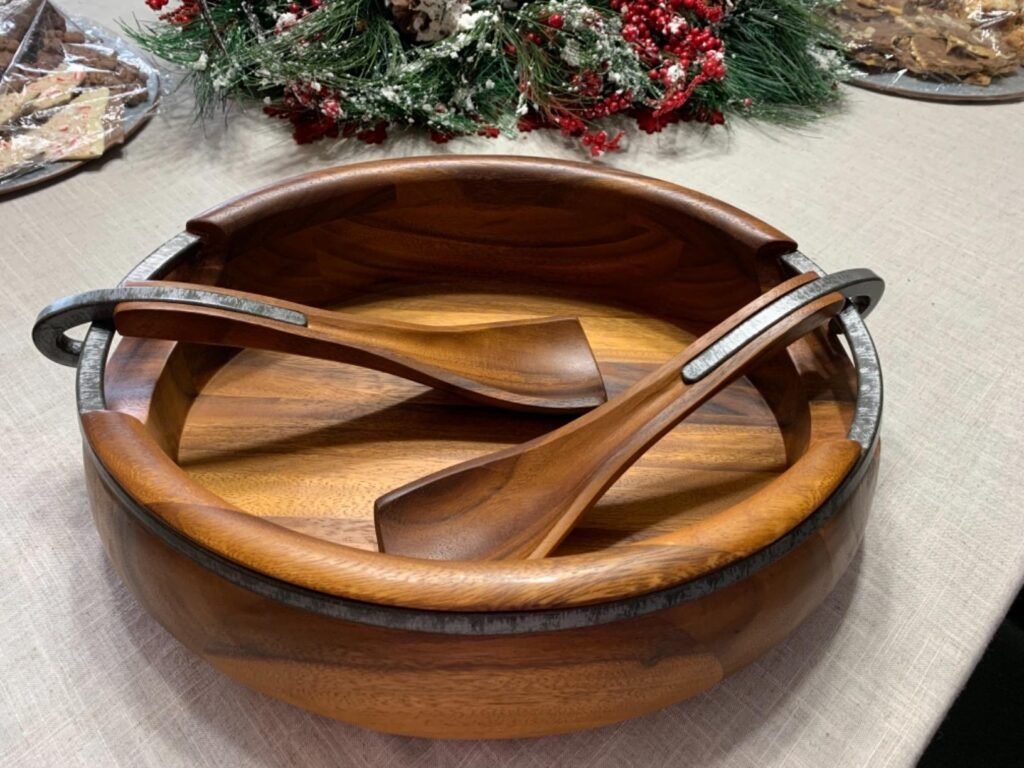
Recognized for its award-winning designs for over 60 years, nambe’s commitment to beauty, artistic integrity, and quality is clear in the brand’s collection of serveware, barware, home décor, and gift items. Nambe works with top designers to create products that combine function and style for the home.
PRODUCT DETAILS: Includes (1) Nambe anvil salad bowl with servers. Constructed from acacia wood and iron-finished Nambe alloy. Dimensions: 16 inches long x 13 inches wide x 5 inches high. Servers: 14 inches long.
Natural Bamboo LEXA 12 Handmade
A stylish bowl for serving healthy snacks or decorating. Whether serving crunchy snacks and chips at a Super Bowl party, storing fresh fruit on the kitchen counter, or decorating your living room, a superb bowl can make a significant impact. We made LEXA Bamboo Serving Bowls that are gorgeous, food-safe, and handmade by Vietnamese artists.
Style and Function Our greener bowls are made from 100% hand-spun Vietnamese bamboo employing traditional technique. The sleek design and natural bamboo material allow you to concentrate on wellness. These extra-large bowls will fit well in your own style and practically wherever you wish to bring warmth and charm to your house.
These handcrafted bowls have modest, distinctive details that make them seem special, so you’re adding a unique element to your house. These enormous bowls can carry 130 oz. (4 quarts) of food, including large salads, giving you additional alternatives for presenting fresh food.
The bamboo wood hue shines out because we want your kitchen or dining area to be full of options and exciting events
These 100% natural bamboo bowls are more sustainable than wood or ceramic/plastic bowls. Indeed, it’s a fast-growing, renewable resource that reduces waste for eco-friendly dependability. Bamboo serving bowls are stronger, lighter, and more durable for your busy life. They’re ideal for families with young children since they don’t chip or shatter like porcelain or plastic.
Nonstick Surface The smooth cover makes these bowls non-stick. The waterproof, stain-resistant, and clean surface may be used for fruit, chips, popcorn, and other nutritious snacks or appetizers.
Classic Minimalist Decor These colorful handcrafted bamboo bowls look fantastic on a kitchen counter, living room mantel, or broad bookshelf, as well as serving bowls. The bohemian look complements farmhouse and contemporary kitchens.
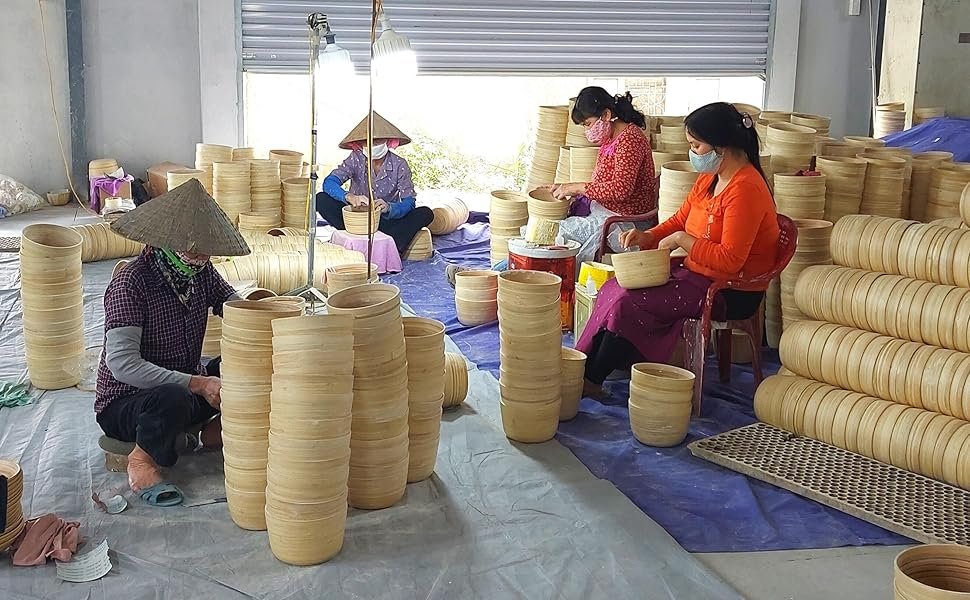
LEXA is a proud Vietnamese brand focused on helping people live their best lives through higher-quality and green products. We employ and empower our female-driven workforce to help them live more sustainable lives while supporting their families and children.
We pay our women artisans fair wages and provide meals at no cost. We are doing our best to provide them with a better lifestyle. Every purchase is going to a real community of hard-working artisans who care about your products and are dedicated to the global good.
| PROS | CONS |
|---|---|
| ✅Charming Originality | ❌ |
| ✅Decorative Kitchen Counter Fruit Bowl | ❌ |
| ✅Light and Strong |
AIDEA Acacia Wood Salad Bowl Set
Comes with two wooden hands and one big bowl; replics the natural action of stirring for better and healthier salad or meals. Made of superior quality solid acacia wood; ideal for serving; waterproof, stain-resistant, odor-absorbing
Perfect for countertop organizing and storage, versatile use calls for salad, fruit, snacks, cereal, or cornflakes.
Excellent Kitchenware: Wooden furniture serves as house décor and improves quality of living and attractiveness.
Care Instructions: Keep away from heat and sunlight; store in a well-ventilated area; do not put in dishwasher, microwave, freezer, or oven.
We take your worries seriously that our acaciaware is foodsafe and nontoxic. Safe for family usage. Natural and distinctive acacia wood grain varies, so each one may appear different.
Simple, stylish, multipurpose object naturally suitable for daily usage. For green salad, spaghetti, bread, fruit, cereal, movie-night popcorn, home décor, and centerpieces.
Great gift for any event or holiday. This is a terrific birthday, wedding, anniversary, New Year’s, or housewarming present for friends and family.
- Avoid water immersion.
- Not for microwave, dishwasher, oven, or freezer.
- Avoid steel wool, strong detergents, and abrasives.
- Handwash only, easy clean.
- Clean with soapy water and rinse after each use. Dry promptly.
- Wipe the salad bowl with oil after use to prolong its life.
- Store in a cool, well-ventilated location.
- Classic and long-lasting. Love her tenderly.
| PROS | CONS |
|---|---|
| ✅Classic and long-lasting. Love her tenderly. | ❌Avoid water immersion. |
| ✅Natural organic plantation-grown | ❌Not for microwave, dishwasher, oven, or freezer. |
| ✅Perfect for countertop | Avoid steel wool, strong detergents, and abrasives. |
Kaizen Casa Wooden Round
The beautiful Kaizen Casa Wooden Round Serving Bowl will help you to create unforgettable dining experiences. Made from Acacia hardwood, this exquisitely crafted bowl is the ideal centerpiece for any celebration as it blends looks and utility.
Presenting fresh fruit, delicious sweets, or savory nibbles, its substantial size and elegant circular form make it perfect to highlight any meal and guarantee great presentation. This adaptable bowl easily improves your eating experience, whether you’re having a formal meal or a laid-back get-together, and gives your house décor a little rustic appeal.
Kaizen Casa will help you to embrace the fusion of sustainability and design. The first environmentally friendly hardwood from acacia. Perfect for storage of bread, chocolates, or fruits as well as for display in the living room or kitchen.
Beautiful circle Made of solid, acacia hardwood, shaped serving bowls are ideal for presenting fruit, candies, chips, and other snack foods in the kitchen or dining room or couch table, picnic, catered events, weddings, Diameter -25.4 cm; Size (INCH): Diameter -10″.
TIP:
We advise against washing this product under running water. To clean, wipe with towel dry and moist cloth. Apply oil regularly using a cloth or towel and leave to dry long to maintain the beauty of the Acacia wood.Other Recommended Wooden Bowls
AIDEA Wooden Salad Bowls Set, Large Acacia Wood
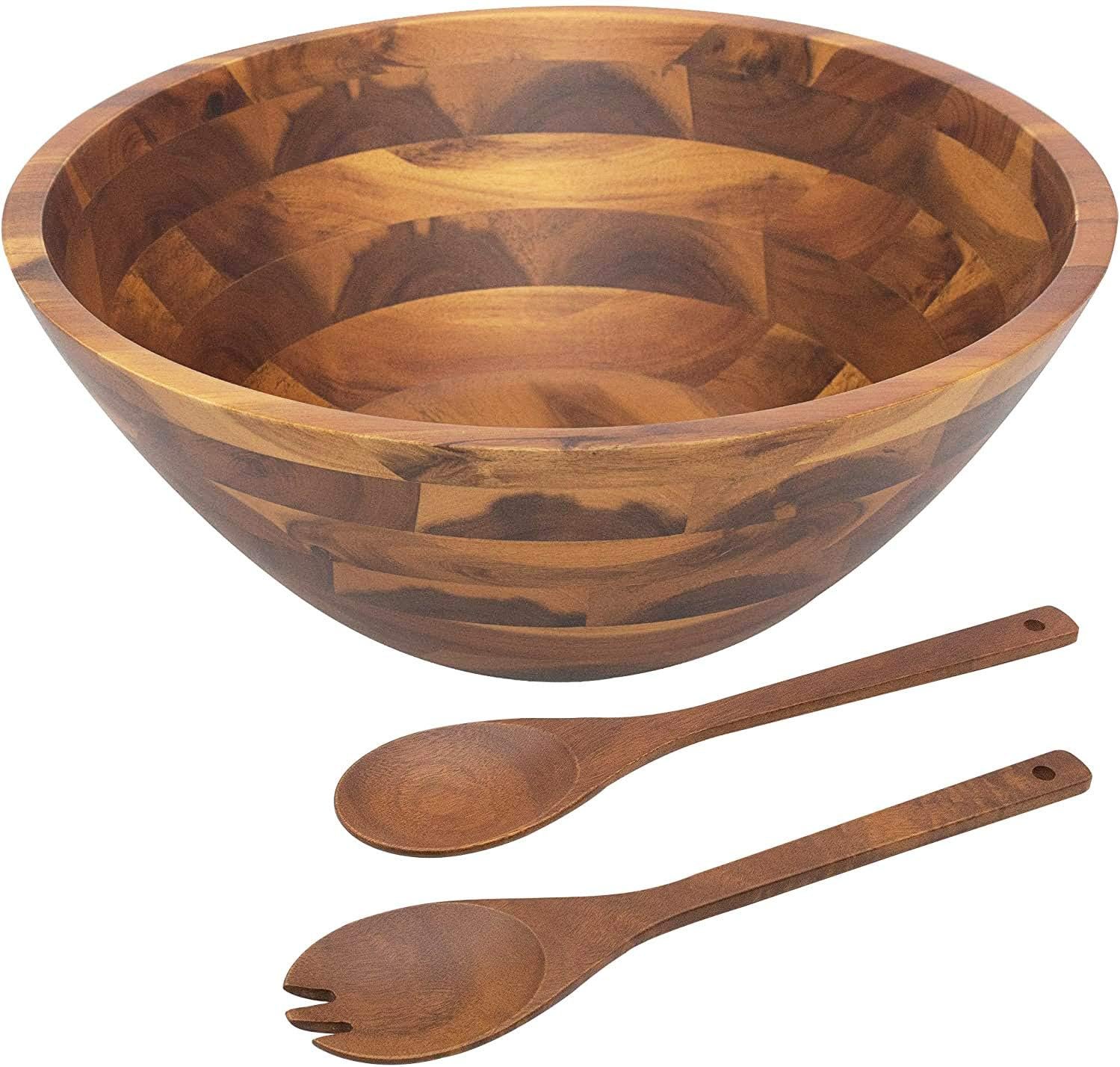
REUBENS Wooden Bamboo
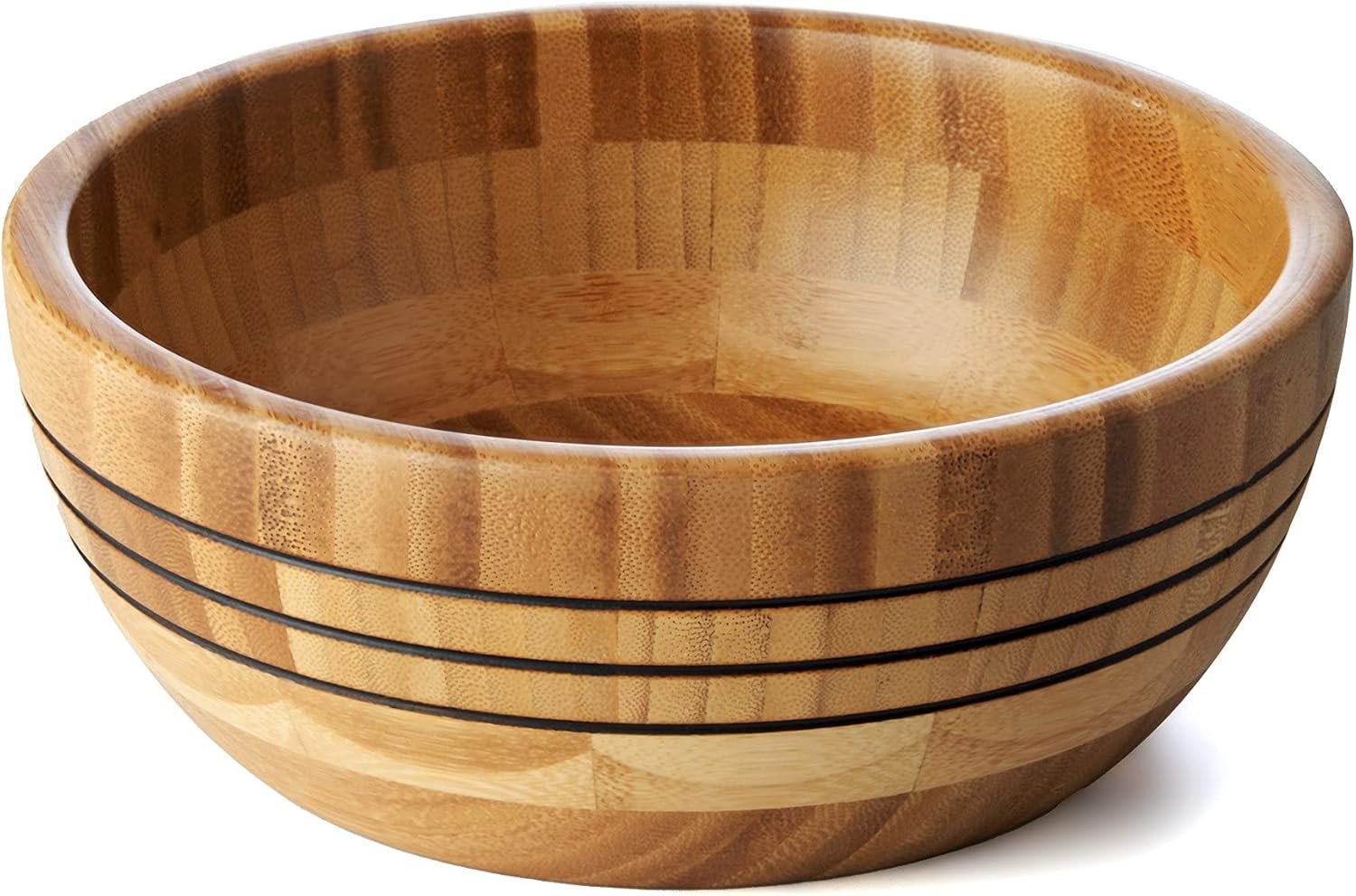
Lipper International Acacia Round Flair
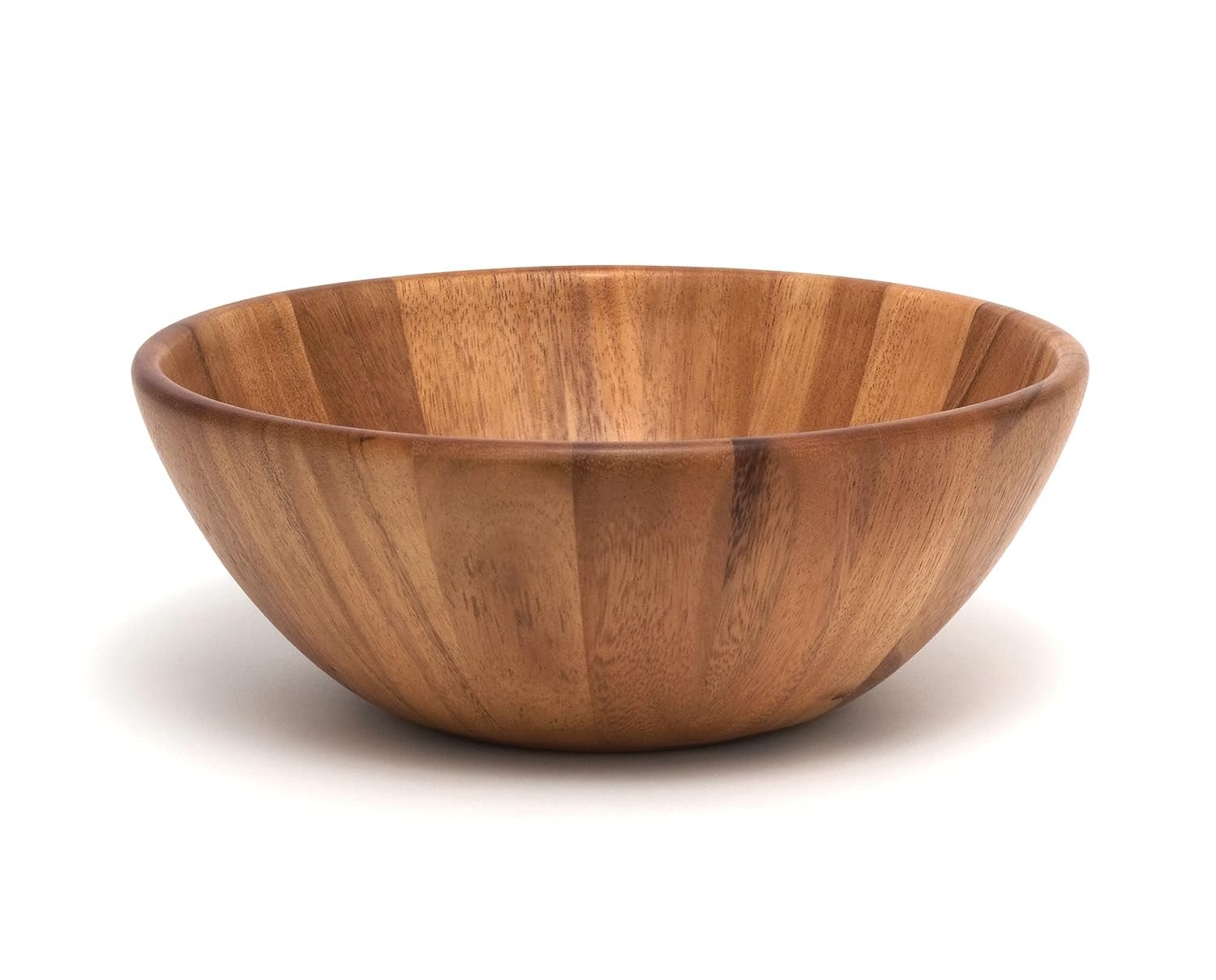
Natural Wooden Tray
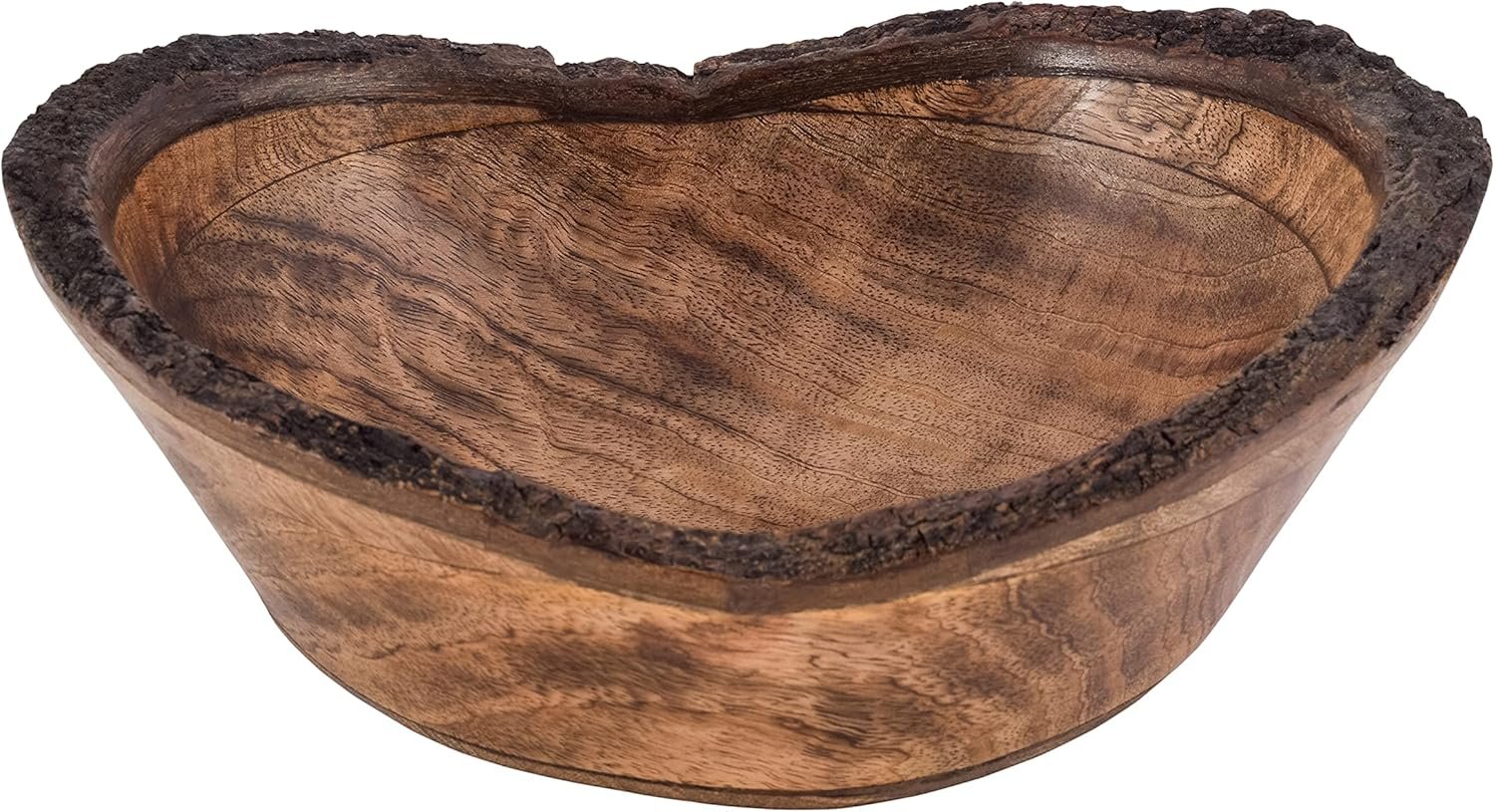
Ironwood Gourmet 28679 Fuit Acacia

Maintenance Tips for Wooden Salad Bowls
Knowing salad bowl maintenance tips and how to maintain a wooden salad bowl keeps it safe for meals and beautiful. With a little care, your wooden salad dish for kitchen usage will endure for generations, giving warmth and beauty to your eating experience.
- Simple-to-Clean Woods: Woods such as maple and walnut have a lower porosity, which makes them easier to clean and reduces the risk of bacterial growth.
- Bowls need regular conditioning with food-safe oils, such as mineral oil, to keep the wood hydrated and avoid cracks.
- Storage Tips: Keep wooden bowls in a dry, cool area, away from direct sunlight or heat, to avoid warping.
Maintaining wooden salad bowls with the correct oils is a minor investment in their beauty and utility. Use these salad bowl care recommendations to preserve the beauty of your wooden utensils. Maintenance is necessary to preserve the beauty and longevity of wooden bowls for kitchen usage. Follow these easy salad bowl care tips to keep your bowl in perfect shape for years.
Properly clean your wooden salad bowl
Hand wash only: Wash your wooden salad bowl by hand. Wash the surface carefully with warm water and mild soap.
Avoid Soaking: Never immerse your bowl in water, since the wood may bend or shatter.
Immediately dry: A soft towel should be used to dry the bowl after cleaning. Leaving it moist might discolor or breed germs.
These easy actions will keep your safe wood for salad bowls clean and functioning.
Treat Wooden Salad Bowls with the Best Oils
Maintaining the natural shine and preventing dryness of your hardwood bowl requires conditioning.
Best Wooden Salad Bowl Oils: Choose food-safe oils like mineral, beeswax, or coconut. These oils permeate wood and preserve it.
How often to oil: Apply oil every couple weeks or when the bowl feels dry. Apply oil to the wood with a clean, soft cloth and let it soak overnight before cleaning away excess.
Regular conditioning protects your bowl from cracks and dryness and improves its beauty.
Avoid Harsh Conditions
Proper storage is as vital as cleaning and conditioning.
Keep your bowl away from direct sunlight and heat sources like stoves and radiators. Wood may split and dry out under extreme heat.
Store your wooden salad bowl in a cold, dry place to avoid warping or mold. These easy steps keep your bowl sturdy and effective.
Longevity Salad Bowl Maintenance Tips
More ways to maintain your wooden salad bowl:
Polish occasionally: To restore luster and smoothness, buff your bowl with a soft cloth.
Avoid Abrasive Cleaners: Avoid damaging wooden bowls with strong scrubbers or chemicals.
Rotate various wooden bowls to equally disperse wear.
FAQs
Are All Wooden Bowls Food Safe?
Not every wooden bowl is food-safe. Bowls constructed of unprocessed hardwoods such as cherry, maple, and walnut are typically suitable for food usage. Avoid bowls made of treated, discolored, or softwoods, since they might absorb toxic chemicals or house germs. Always use non-toxic, food-safe wooden bowls.
Are Wood Salad Bowls Dishwasher Safe?
No, wooden salad bowls are not dishwasher safe. Dishwashers’ high heat and continuous exposure to moisture may cause wood to bend, fracture, or lose its gloss. Washing wooden bowls in the dishwasher may also remove their natural oils, resulting in dryness and a shorter lifetime.
Instead, hand-wash your wooden bowls with mild soap and warm water, then quickly dry them with a soft towel. This process protects the bowl’s durability, natural beauty, and food safety for years. Proper maintenance is required to maintain your wooden salad bowls in great shape.
Can Olive Oil be Used to Maintain Wooden Bowls?
No, olive oil is not advised for maintaining wooden bowls. Olive oil may become rancid over time, creating an unpleasant odor and sticky residue in the bowl. This rancidity may also attract microorganisms, rendering the bowl unsuitable for food consumption.
Instead, choose food-safe oils such as mineral oil, beeswax, or coconut oil, which do not deteriorate and provide long-term protection. These oils permeate the wood, retaining its natural moisture and avoiding fissures. Proper oiling increases the bowl’s longevity and keeps it looking good, making it a safer and more effective choice.
Should I use a wood salad bowl that has cracked?
No, do not use a wooden salad dish with cracks. Cracks in the wood allow germs to grow, making it extremely hard to clean the bowl completely. This may jeopardize food safety since hazardous germs can survive washing. Cracks also undermine the bowl’s structural integrity, leading it to shatter more easily over time.
If you see substantial fractures in your wooden bowl, replace it to keep it safe for food consumption. Regular maintenance using food-safe oils may help prevent cracking and increase the life of your bowl. To avoid such concerns, always prioritize bowls constructed of robust, safe wood for salad bowls.
Final Thought
Choosing the best wood for salad bowls is ultimately about balancing safety, durability, and style. Among woods with natural beauty, long-lasting performance, and food-safe properties are cherry, maple, walnut, and acacia. Apart from improving your meal experience, a well-made wooden salad bowl gives your kitchen classic appeal. To guarantee your bowl will endure for years, keep it well cleaned and conditioned. Your wooden bowl becomes more than simply serveware with the correct choosing it’s a piece of utilitarian art.

